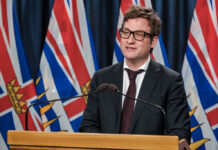
STUDENTS entering grades 11 and 12 in September will have more new courses and personalized learning opportunities than ever, making sure future graduates are on a path to success.
“The exciting changes we are making today will help ensure that all kids graduate with the skills, competencies and attitudes they need to adapt and thrive in the ever-changing careers of tomorrow,” said Rob Fleming, Minister of Education. “In addition to completing our K-12 curriculum redesign process with the implementation of grades 11 and 12 this school year, we are also rolling out a modernized graduation program that will give students unprecedented opportunities to explore where they want to go in life to build bright futures for themselves and their families.”
B.C.’s new K-12 curriculum is personalized and flexible, and focuses on the core competencies of critical thinking, communication, and social and personal responsibility, to help students succeed in a rapidly changing world. It was redesigned in collaboration with more than 300 B.C. and Yukon educators and academic specialists.
The Province’s efforts to implement a generational change in curriculum and assessment, while achieving some of the world’s best student outcomes, was recently showcased to education leaders from around the globe at the Organisation for Economic Co-operation and Development Future of Education and Skills 2030 Project meeting held in Vancouver in May 2019.
Under the new graduation program, students can develop the skills that post-secondary institutions and future employers are looking for, like creative, analytical, entrepreneurial and leadership skills. New course options exist for students in a range of areas, including environmental science, computational skills, engineering, robotics, digital media and arts.
The modernized graduation program also requires students to complete two new career education courses and an in-depth project that offer opportunities for more hands-on, real-world learning. This will provide students with career-life exploration opportunities, allowing the development of useful tools for their chosen path, whether it’s college, university, trades training and, ultimately, the workforce.
In partnership with the First Nations Education Steering Committee, Métis Nation BC and the British Columbia Teachers’ Federation, the ministry is also working on two new resources for teachers to support increased integration of Indigenous knowledge, perspectives and content in K-12 classrooms. Working collaboratively with local Indigenous communities to create resources and bring local Indigenous knowledge and perspectives into the classroom is also addressed. In addition, a number of Indigenous-focused courses are among the range of new courses from which students can choose.
Teachers will also be supported with new resources that have been developed to help with the implementation of the new curriculum. The Ministry of Education worked with teachers and key education partners to create resources to help teachers deliver the redesigned physical and health education curriculum with guides for elementary and secondary teachers. These guides, along with a curated list of existing resources, will provide teachers with a variety of instructional suggestions and tips for teaching important health topics, such as consent, stress and anxiety, safe sex, mental health stigma, cyberbullying and online safety.
Also this school year, Grade 10 students will write a new mandatory graduation assessment in literacy, in addition to a mandatory graduation assessment in numeracy that was introduced during the 2017-18 school year. These assessments maintain the rigour and high standards of the previous course-based provincial exams and are fully aligned with the new curriculum. They are designed to evaluate essential numeracy and literacy skills developed across different areas of learning and grades, rather than testing knowledge gained from one specific course.
Andrea Sinclair, President, BC Confederation of Parent Advisory Councils, said: “All parents believe their children should graduate from the K-12 public education system with the skills needed to take their next steps – college, university, trades or entrepreneurship – in their adult life as an educated citizen. The now-completed curriculum redesign, combined with the new assessments and career education courses as part of the overall graduation program, will enable all students to achieve their potential for future success.”
Chris van der Mark, President, BC School Superintendents Association (BCSSA), said: “B.C.’s public education system continues to be admired around the globe for its equity and high standards. The ongoing transformation of the K-12 curriculum continues to increase choice for students and BCSSA members will continue their work in districts to maximize outcomes for students into the future.”
Quick Facts:
- The new K-9 curriculum was implemented in September 2016, followed by Grade 10 in September 2018.
- Grades 10 to 12 students will still be required to complete at least 80 credits for graduation and will continue to receive report cards with letter grades and percentages for all courses. Mandatory graduation assessment results will be reported as stand-alone items on student transcripts.
- Starting in the 2020-21 school year, a mandatory graduation assessment in literacy for students in Grade 12 will be introduced. The new Grade 12 literacy assessment will be developed in collaboration with key education partners and stakeholders. As with the Grade 10 numeracy and literacy assessments, the new Grade 12 literacy assessment will be piloted prior to provincewide implementation.
- The changes to the B.C. Graduation Program and K-12 curriculum were made following extensive engagement with students, parents, education partners and stakeholders, post-secondary institutions and representatives of various industries.
- The Ministry of Education and Ministry of Advanced Education, Skills and Training are working with partners to create a careers strategy that will ensure students will benefit from programs designed to help them transition from high school and post-secondary education with the skills, competencies and attitudes needed to enter the workforce and build bright futures for themselves.









